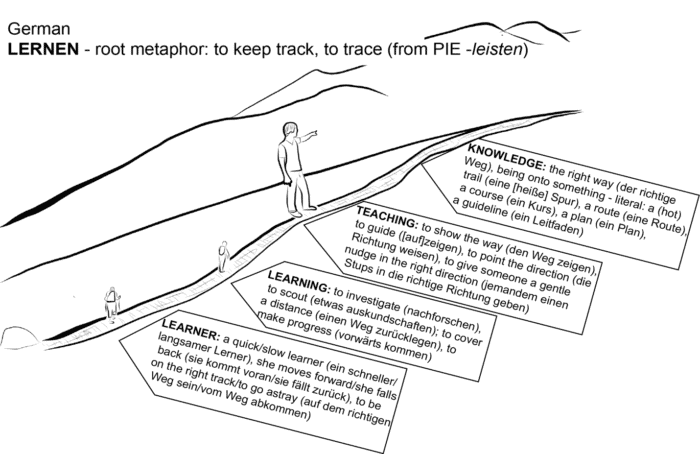Root Metaphor
To track – attainment metaphorIllustrative Example of Root Metaphor


Etymology
The word lernen is related to lehren (to teach) and List (noun: trick, trickery). It belongs to the word group/word family leisten, which originally meant “to keep track, to trace, to look into (sth.), or to investigate”. The word lais means in Gothic (language) “I know”, and more specifically “I have investigated”. The Indogermanic root *lais means “trace (noun), track (noun), line or groove”. The origin of the word lernen entails a passive and an active meaning, i.e., “to leave traces” (subjectivized meaning), but also “to track or to investigate (sth.)” (objectivized meaning).Common phrases of learning and teaching
Common phrases about learning (lernen)- Auf dem richtigen Weg sein - Being on the right way
- Auf die harte Tour lernen - Learning the hard way
- Vorwärts kommen, weiter kommen - Making headway
- Einen Schritt voraus sein - Be one step ahead
- Eine Nasenlänge voraus sein - Be a nose length ahead
- Den Weg des geringsten Widerstandes gehen - Taking the path of least resistance
- Nicht vom Fleck kommen - not leaving the spot
- Nicht von der Stelle kommen) - not leaving the location
- Wir drehen uns im Kreis - We go round in circles/we make no progress
- Immer vorneweg sein - Be always ahead
- Wo ein Wille ist, ist auch ein Weg - Where there is a will, there is a way
- Etwas von der Pike auf lernen1 - learning from the pike [spear]
- Vorneweg maschieren - marching in front
- Den Schülern das Thema näher bringen - bring the topic nearer to students
- Etwas in die Wege leiten - lead something in the ways
- Der Lehrer leitet die Schüler an - the teacher leads/guides the students
- Jemanden den richtigen/rechten Dreh geben - giving someone the right/correct spin
- Jemanden einen Stups in die richtige Richtung geben - giving someone a gentle nudge in the right direction
- Jemandem etwas einbleuen - beat something into somebody/hammer something into somebody
- Jemandem auf die Finger sehen - looking (closely) at someone’s fingers
- Etwas vorwärts und rückwärts aufsagen können - being able to recite something forwards and backwards
- Etwas von Anfang bis Ende kennen - knowing something from beginning to the end
- Etwas in- und auswending kennen - know something in and out
- Dir sind keine Grenzen gesetz t- there are no boundaries set for you
- Du bist an der richtigen Addresse - you are at the right address
- Nichts Näheres wissen – not knowing the close-by’s
- Ein alter Hase sein - be an old hare
- Eine [heisse] Spur - a (hot) trail
- Der beste Weg [um etwas zu tun - The best way (to do something)
- Der Weg zum Erfolg - The way to success
- Dem steht nichts im Wege - Nothings stands in the way of that
Commentary
Lernen is one of the etymological roots of the English word learn. As such it is very similar and invokes the acquisition metaphor. The picture of the teacher is larger than the student. This deliberate scale is an attempt to represent the fact that the teacher is able to teach hundreds of students. It also implies the relative importance of the teacher. The German language has a formal salutation/polite form using the pronoun Sie that students commonly use when speaking to a teacher. It implies courtesy and respect for the position or rank of the teacher.Implicit Spatial Associations
The tracking – Attainment Metaphor suggests a uni-directional, progressive aspect to learning (ie. Moving forward or falling behind1 This saying uses a military reference: a soldier starts training with a spear.
Please cite this article as:
Francis, K., Davis, B., & Rothschuh, S. (2020). “Lernen" (German) in Metaphors of Learning in Different Languages. https://doi.org/10.11575/8B7N-V637 . https://learningmetaphors.com
⇦ Back to Map
⇦ Back to List
